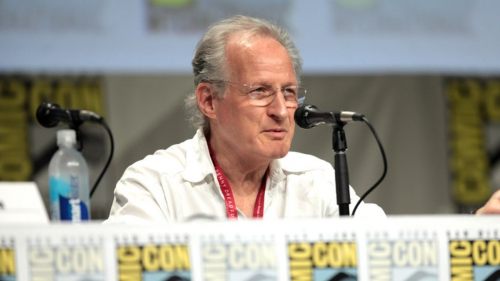The Savage Stack: ALI (2001)
There’s always going to be – for lack of a better term – a stack of films we’ve been meaning to get to. Whether it’s a pile of DVDs and Blu-rays haphazardly amassed atop our television stands, or a seemingly endless digital queue on our respective streaming accounts, there’s simply more movies than time to watch them. This column is here to make that problem worse. Ostensibly an extension of Everybody’s Into Weirdness (may that series rest in peace), The Savage Stack is a compilation of the odd and magnificent motion pictures you probably should be watching instead of popping in The Avengers for the 2,000th time. Not that there’s anything wrong with filmic “comfort food” (God knows we all have titles we frequently return to when we crave that warm and fuzzy feeling), but if you love movies, you should never stop searching for the next title that’s going to make your “To Watch” list that much more insurmountable. Some will be favorites, others oddities, with esoteric eccentricities thrown in for good measure. All in all, a mountain of movies to conquer.
The twenty-sixth entry into this unbroken backlog is Michael Mann’s impressionistic profile of the greatest boxer who ever lived, Ali…

“Bumaye Ali!” The locals chant at the Champ (Will Smith) as he disembarks from his chartered jet onto a tiny runway in Zaire. Muhammad Ali doesn’t know what this phrase means, so he asks an interpreter to clue him in. “It means ‘kill him Ali!’” The man says with a grin, but every muscle in the fighter’s face is taut. Upon leaving the lovely home he stays in with his second wife, Belinda (Nona Gaye), while counting down the days to Don King’s “Rumble in the Jungle”, Ali jogs through the villages and is met with the same shouted psalm. Children can’t believe they’re running alongside the heavyweight legend who, in their minds, never lost to Joe Frazier (James Toney) and can’t have a candle held to him by George Forman (Charles Shufford). He’s the one they paint on the side of their dilapidated homes, not those chumps. But how did he get here?
The answer to that question is only half-answered by Michael Mann’s Ali (’01), which isn’t presenting a traditional biopic as much as it is a kaleidoscopic thesis regarding a breathing avatar’s search for identity. Mann is examining the Greatest’s multiple moral dilemmas, all which masquerade as a cause for him to become the face of. Meanwhile, Intelligence Officers like Bradley (Bruce McGill) monitor his every move whilst helping to organize coups for despots like General Mobutu (Malick Bowens), who will host the historic match the picture climaxes with. A war was waging in all parts of the world, and Cassius Clay was the fighter everyone wanted to recruit. The Nation of Islam needed him to carry their name, as the Civil Rights movement they mocked fought for a place at “the white man’s counter”. Following the shooting of his dear friend, Malcolm X (Mario Van Peebles), and the Nation turning their backs on Ali after he was put on trial for his freedom, he knew that their love (and possibly his own) was a fraud. “The more real you get, the more unreal the world becomes,” John Lennon once said to the boxer, and he was the cleverest white man Ali had ever met.
Will Smith is one of our greatest movie stars and, once upon a time, he could’ve been one of our greatest actors, too. With Ali, we receive a reminder of both notions – the superb raconteur balancing his take on the Champ between imitation (complete with remarkable physical transformation) and humanistic remembrance. Smith never fully disappears into the role, but that’s for the better, as his walk of fame mug adds an aura of unknowability that strengthens Mann’s thematic through-line regarding the fighter’s search for his character, and what that both means to him and a public who alternately adores and despises him. Smith gets the look, mannerisms and jokey tenor of Ali’s voice down pat – an impersonation that never becomes the cinematic equivalent of a nightclub act like so many of its biopic peers. But its in the moments of trademark Mann “bodies in space” silent emoting where the nuances of Smith’s performance shine; flickers behind his eyes captured on empty trains and streets via grainy, pixelated DV photography that reveal just how alienating the struggle for Ali’s soul left him. Once the US Gov’t declares him a criminal for refusing to engage in their heinous conflict (Smith’s delivery of “no Viet Cong ever called me nigger” is perfect), Cassius X is not only a Champion without a cause, but also a country.
Looking back on Ali and Smith nearly twenty years after the picture’s initial release (not to mention critical/commercial rejection and subsequent director-supervised tinkering), the baggage of Smith’s celebrity hangs onto the performance, adding a layer that was only developing when prints projected in first run theaters. Since ’96 – when Smith punched that alien in the face, welcoming him to Earth – it was clear that a new marquee idol had been minted, fully shedding the TV rags of his Fresh Prince rap persona. Smith had already started working his way toward silver screen hero status with Michael Bay’s Bad Boys (’95), and showed he could act without a laugh-track in Six Degrees of Separation (’93). Yet the half-decade between Independence Day (’96) and Ali contained another megahit in MIB (’97), a reteaming with Jerry Bruckheimer in Enemy of the State (‘98), and an embarrassing summer failure in Wild Wild West (’99). While Smith’s charm was undeniable, his consistency was questionable.
Signing onto Mann’s movie immediately after his ill-advised teaming with Robert Redford for The Legend of Bagger Vance (’00) was an obvious signal that the actor was pursuing a very specific strand of Hollywood respectability. When Ali tanked at the box office and Smith lost at the Academy Awards, the star spent the next decade on sequels and popcorn fodder, while flirting with the high-profile cult of Scientology. Smith occasionally took on projects that superficially seemed like an attempt to reignite his love of actually acting – The Pursuit of Happyness (’06)and Seven Pounds (’08) – but stories regarding his rejection of Tarantino projects due to their not suiting his “brand” have been disheartening, to say the least. Will Smith’s always been in a peculiar Hollywood role – one of the rare African-American actors who crossed over completely with white America and became a household name. But with this prominence came a conflict of personality preservation not too unlike the Champ’s (minus the grave political implications, of course). Does Smith work to maintain his status as a movie star, or does he gear his choices toward pushing the limits of his craft as a performer? Sadly, the data seems to point toward the former, with Ali being something of an anomaly on a fascinating CV. Mann’s movie is, in a way, a glimpse at what could’ve been versus the reality of Smith’s career now.
Where Mann’s movie is frank about Ali’s “love ‘em and leave ‘em” pattern of marital hopscotch, his most vital relationship is shared with a man on television. Howard Cosell (portrayed with dead bang precision and distracting prosthetics by Jon Voight) obviously adores the Greatest from afar, but also never lets him off the hook. The frank candor with which he questions the fighter earns Ali’s respect, even as he’s trying to brush Cosell’s toupee off during a live broadcast. Smith and Voight generate electric chemistry whenever they’re sharing a scene together; the naked rapport of co-workers who genuinely engage with each other’s’ work and lives, in that order. But Voight’s Cosell is also in awe of Ali’s power as a media manipulator, and recognizes what a force of change he can be, conveying this enthusiasm with loving glances while keeping a mask of professional objectivity in place. It’s a beautiful performance, brought to a head with one brief phone call, as Cosell strains to keep it together while delivering the news that Muhammad’s boxing license had been reinstated after being wrongfully stripped following his draft controversy. It’s the workplace romanticism Mann perfected with The Insider (’99), extended to the arena of professional sports.
Ali and Cosell’s bond stands in stark contrast with how the Champ treats the rest of the media. As Ali’s self-awareness grows, he comprehends the power of his own persona, and uses it to play reporters always looking for a quote about the latest incident overseas. There’s a forced dumbness that demonstrates he knows he’s a man playing a part for these prowling, insidious forces, but that doesn’t mean he can’t force them to play their part, as well. “Yeah, I know where Vietnam is. It’s on TV,” he says to a cold caller, doing his best Kentucky bumpkin. When pressed, he responds “Southeast Asia? It’s there, too?” The absolute rejection of his legal obligation to fight for his country is the capper to this joke, as he definitively announces that he’s not going to be a slave to a government’s regulations if he doesn’t believe they’re morally conceived. Mann’s portrait of Ali reveals an imperfect individual who is as stubborn as a brick wall, but often not without purpose.
It took multiple viewings (of three different cuts) for Ali to finally land correct with this writer, but once it did (via ‘17’s “political” re-edit), Mann’s visual treatise becomes a dense, emotionally complex piece of work that still delivers the usual thrills we’ve come to expect from the auteur. Michael Mann shooting boxing is a thing of beauty, as Emmanuel Lubezki’s intrusive camera allows us to smell the sweat and canvas as we take blows to the face and body. Overhead, globes of light glow and stretch into infinity, as if extraterrestrials have also taken notice of this superhuman and his athletic conquests. But Mann’s just as infatuated with the intimacy of boxing as he is with the raw brutality of the sport. He gets in close to hear the sweet nothings these gladiators whisper into one another’s ears once they collapse into an exhausted hug, each looking to the deliver the death blow in order to end this savage entertainment. The technicality of each competitor’s dance moves is documented via fleeting shots of their feet, while their fists blur through space, connecting with sweaty flesh and creating mortar shell echoes. Though it strengthens Ali’s transformative themes, losing two separate fights in this third edit omits some of Mann’s most poetic violence, but what remains is probably more impactful, thanks to the newly enhanced clarity of vision.
Though its failed to impress many viewers, Ali still contains some of the most vibrant filmmaking of Mann’s career. Along with the utterly stunning “Bumaye!” sequence, the opening twenty minutes of Ali are some of the most striking in an already intimidating visual oeuvre. As Sam Cooke (David Elliott) takes the stage and whips a crowd of female admirers into frenzy via a medley of his immortal tunes, Ali trains, jogging down city streets and rumbling a speed-bag, generating his own hypnotic rhythm. Mann intercuts digital footage amongst the traditional 35mm, creating an almost hallucinatory impression of this period, while simultaneously catching us up to speed with both the Greatest’s life and the political minefields he navigates. We see a young Cassius Clay’s father (Giancarlo Esposito) sign his son’s talents away to wealthy managers after painting white Christ figures. We meet corner man Drew “Bundini” Brown (an otherworldly Jamie Foxx), who helped inspire many of the Champ’s rhyming taunts. Ali’s trainer, Angelo Dundee (Ron Silver), shouts at his fighter to keep pushing himself, while Malcolm X condemns Martin Luther King (LeVar Burton) and his recommendation to “turn the other cheek”. Sonny Liston threatens to beat Ali’s ass like he was the Champ’s daddy, as the Greatest flashes back to a segregated bus, recalling a newspaper headline screaming about the gruesome murder of Emmett Till. It’s a masterful and intoxicating ride through history, daring the audience to keep up before slowing down as Ali observes and reacts to this tumultuous universe.
“All they are is political. You’re the heavyweight champion of the world,” Howard Cosell says to Ali at one point, and the legendary sportscaster couldn’t be more right. Muhammad Ali was one man who became bigger than the times in which he existed, so much so that operations masterminded by the FBI, COINTELPRO and the CIA were all put into motion to keep the Greatest (and the PoC who looked up to him) in what those organizations considered to be their correct social standing. Murderous tyrants watched the fighter via the only broadcast available in their country, just so they could see this man who became the symbol they all wanted to define and control. But Ali refused to give his soul over to anyone but the women who briefly loved him, the fans who cheered him on, and the journalist who realized what he was transforming into. Even his religious affiliation waffled, depending on the Nation’s ever-evolving political mechanizations. Michael Mann’s Ali has often been criticized by many as being a shaggy chronicling of a legend that misses who he was as a man. However, it’s arguable that Mann concedes this heavyweight and his era were never able to be perfectly comprehended in the first place. So, what we’re left with is an optical dissertation on an enigma; a riddle that can never be solved, because the inability to do so instills a healthy amount of modern questioning in its audience, long after those bright house lights are extinguished.
Ali is available now on a Commemorative Edition Blu-ray containing the third director supervised edit of the film.



